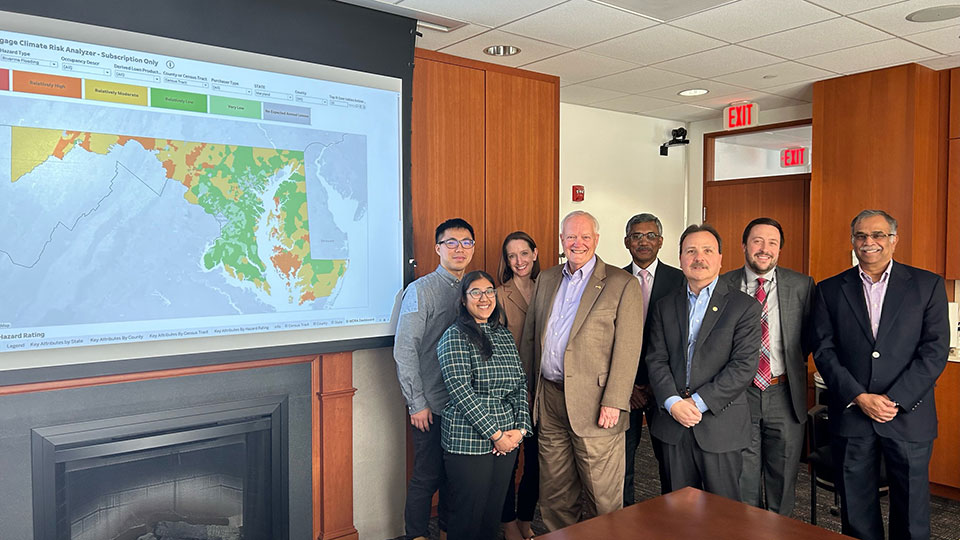
The Maryland Department of Emergency Management is the state’s leader in risk reduction, disaster preparedness and resiliency. As a result, they are uniquely positioned to support the delivery of technical and financial resources to local communities and their constituents. These officials “are looking to get the ‘biggest bang for the buck’ in terms of where such allocations and reallocations will be most impactful,” says Clifford Rossi, professor of the practice and Smith Enterprise Risk Consortium (SERC) Director at the University of Maryland’s Robert H. Smith School of Business.
“The home often is the most valuable asset an individual will have, and with climate change increasing the frequency and intensity of extreme weather events, the availability and cost associated with homeowners insurance will be a major crisis in this country in less than five years,” he says, suggesting a widely acknowledged Florida property insurance crisis as a harbinger.
In response, Rossi, with students in Smith’s Master of Quantitative Finance program, have developed a Mortgage Climate Risk Analyzer – forthcoming from SERC both by subscription and in a free, scaled-down version.
With two of his collaborating MQF student researchers, Harini Mantripragada and Roger Chang, Rossi demonstrated the tool on Feb. 15, 2024, for Secretary of Emergency Management Russell Strickland, Deputy Executive Director of Emergency Management Chas Eby and State Public Assistance Officer Sara Bender. Joining the state officials: Dean Prabhudev Konana, Associate Dean for Strategic Initiatives P.K. Kannan, Smith Director of Executive Education Jonathan Southgate and Smith Director of Initiatives and Federal Programs Mary Bittle Koenick.
The tool emerged from Rossi leading his MQF students in a recent experiential learning project for government-sponsored mortgage enterprise Freddie Mac.
“Freddie Mac sits on top of a $3.4 trillion mortgage portfolio,” Rossi told the gathering. “They get a lot of questions from their regulator, the Federal Housing Finance Agency, on – and they want to understand – what that physical risk exposure looks like to their borrowers. So, we combined physical, national risk datasets from FEMA with the Homeowner Disclosure Act data from the Consumer Finance Protection Bureau.”
Rossi reiterated a previously published description of the tool:
The students created an interactive dashboard of 13 million single-family mortgage loans originated in 2021 and merged it with FEMA's National Risk Index tool for all 78,000 U.S. Census tracts across 18 different climate hazards, including earthquakes, wildfires, hurricanes, coastal and river flooding, tornados and drought. Then they randomly selected 1 million mortgage loans and used a battery of different machine learning models and performance statistics to analyze the data, looking for such effects as adverse selection against GSEs Freddie Mac and Fannie Mae, impact on low- and moderate-income borrowers, minorities and other key effects. … [The user] can point and click on any county in the U.S. for any climate hazard type and get figures on borrower characteristics such as race, age, income. … Fannie Mae and Freddie Mac, insurance companies, and policymakers all could use this information during the underwriting process and for figuring out which areas need more government resources/intervention. … Senior leaders at Freddie Mac were impressed with the extent and complexity of the students' analysis, and their ability to explain difficult concepts, calling the presentation better than some by employees and consultants.
The work, Rossi says, "also illustrates Smith students producing analysis that’s real-time and impactful to markets.”
For more information, visit the Smith Enterprise Risk Consortium homepage.
Media Contact
Greg Muraski
Media Relations Manager
301-405-5283
301-892-0973 Mobile
gmuraski@umd.edu
About the University of Maryland's Robert H. Smith School of Business
The Robert H. Smith School of Business is an internationally recognized leader in management education and research. One of 12 colleges and schools at the University of Maryland, College Park, the Smith School offers undergraduate, full-time and flex MBA, executive MBA, online MBA, business master’s, PhD and executive education programs, as well as outreach services to the corporate community. The school offers its degree, custom and certification programs in learning locations in North America and Asia.